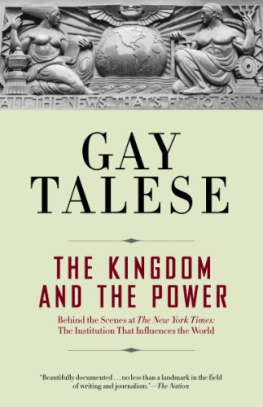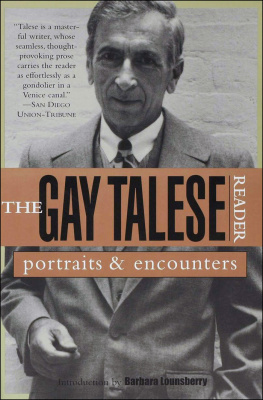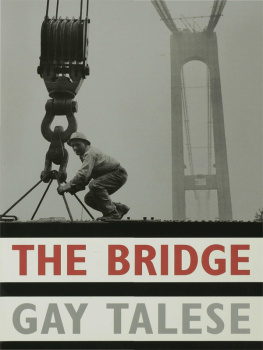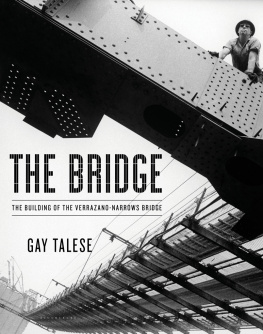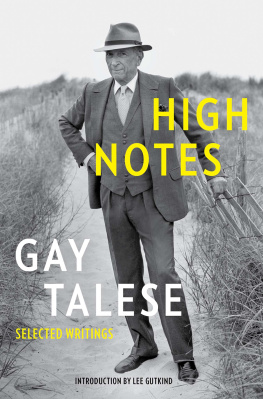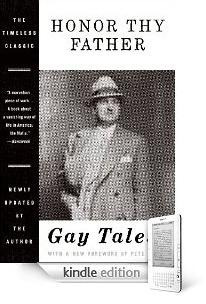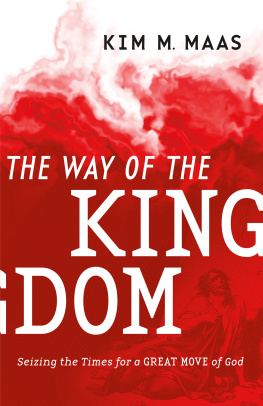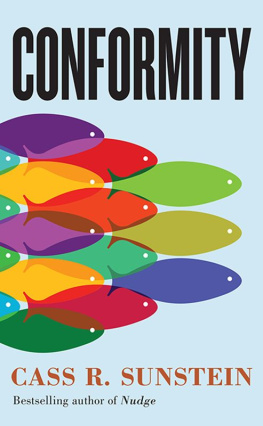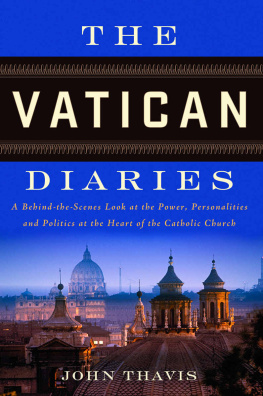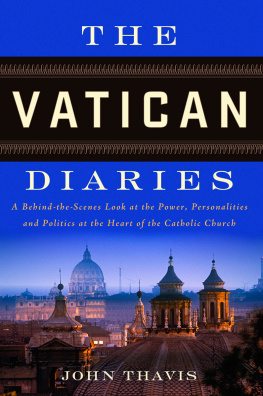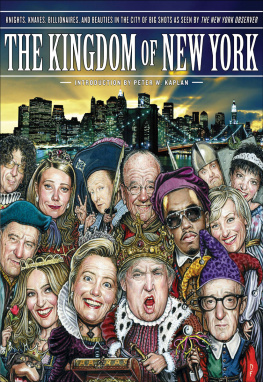Gay Talese - The Kingdom and the Power: Behind the Scenes at The New York Times: The Institution That Influences the World
Here you can read online Gay Talese - The Kingdom and the Power: Behind the Scenes at The New York Times: The Institution That Influences the World full text of the book (entire story) in english for free. Download pdf and epub, get meaning, cover and reviews about this ebook. year: 2013, publisher: Random House Publishing Group, genre: Art. Description of the work, (preface) as well as reviews are available. Best literature library LitArk.com created for fans of good reading and offers a wide selection of genres:
Romance novel
Science fiction
Adventure
Detective
Science
History
Home and family
Prose
Art
Politics
Computer
Non-fiction
Religion
Business
Children
Humor
Choose a favorite category and find really read worthwhile books. Enjoy immersion in the world of imagination, feel the emotions of the characters or learn something new for yourself, make an fascinating discovery.
- Book:The Kingdom and the Power: Behind the Scenes at The New York Times: The Institution That Influences the World
- Author:
- Publisher:Random House Publishing Group
- Genre:
- Year:2013
- Rating:3 / 5
- Favourites:Add to favourites
- Your mark:
- 60
- 1
- 2
- 3
- 4
- 5
The Kingdom and the Power: Behind the Scenes at The New York Times: The Institution That Influences the World: summary, description and annotation
We offer to read an annotation, description, summary or preface (depends on what the author of the book "The Kingdom and the Power: Behind the Scenes at The New York Times: The Institution That Influences the World" wrote himself). If you haven't found the necessary information about the book — write in the comments, we will try to find it.
The Kingdom and the Power: Behind the Scenes at The New York Times: The Institution That Influences the World — read online for free the complete book (whole text) full work
Below is the text of the book, divided by pages. System saving the place of the last page read, allows you to conveniently read the book "The Kingdom and the Power: Behind the Scenes at The New York Times: The Institution That Influences the World" online for free, without having to search again every time where you left off. Put a bookmark, and you can go to the page where you finished reading at any time.
Font size:
Interval:
Bookmark:
The Kingdom and the Power
A landmark in the field of writing and journalism.
The Nation
Beguilingly gossipy, intimately anecdotal a grand epic that personalizes the impersonal and turns monolith to flesh.
The New York Times
An epic work rich in anecdote, intimate in detail a fascinating parade of personalities a superb study of people and power and a profoundly influential institution.
Womens Wear Daily
Superbly triumphant.
New York Post
Seldom has anyone been so successful in making a newspaper come alive as a human institution.
The New York Times Book Review
Far and away the best book about an American newspaper ever published and possibly the best ever written about any newspaper.
Saturday Review Syndicate

2007 Random House Trade Paperback Edition
Copyright 1966, 1967, 1968, 1969 by Gay Talese
All rights reserved.
Published in the United States by Random House Trade Paperbacks, an imprint of The Random House Publishing Group, a division of Random House, Inc., New York.
R ANDOM H OUSE T RADE P APERBACKS and colophon are trademarks or Random House, Inc.
Originally published in hardcover in the United States by The New American Library, Inc., in association with The World Publishing Company.
Some of the material in this book was previously published in a different form, some in the same exact form, in Esquire and Harpers magazines, between 1966 and 1969.
LIBRARY OF CONGRESS CATALOGING-IN-PUBLICATION DATA
Talese, Gay.
The kingdom and the power : behind the scenes at The New York times : the institution that influences the world / by Gay Talese.
p. cm.
Originally published: New York, World Pub. Co., 1969.
eISBN: 978-0-679-64473-6
1. New York times. I. Title.
PN 4899.N42T574 2007
071.47dc22
2006047953
www.atrandom.com
v3.1

M ost journalists are restless voyeurs who see the warts on the world, the imperfections in people and places. The sane scene that is much of life, the great portion of the planet unmarked by madness, does not lure them like riots and raids, crumbling countries and sinking ships, bankers banished to Rio and burning Buddhist nunsgloom is their game, the spectacle their passion, normality their nemesis.
Journalists travel in packs with transferable tension and they can only guess to what extent their presence in large numbers ignites an incident, turns people on. For press conferences and cameras and microphones have become such an integral part of the happenings of our time that nobody today knows whether people make news or news makes peopleGeneral Ky in Vietnam, feeling no doubt more potent after his sixth magazine-cover story, challenges Red China; after police in New York raided the headquarters of young hoodlums, it was discovered that some gang leaders keep scrapbooks; in Baltimore, a day after the Huntley-Brinkley Report mentioned that the city had survived the summer without a race riot, there was a race riot. When the press is absent, politicans have been known to cancel their speeches, civil rights marchers to postpone their parades, alarmists to withhold their dire predictions. The troops at the Berlin Wall, largely ignored since Vietnam stole the headlines, coexist casually, watching the girls go by.
News, if unreported, has no impact. It might as well have not happened at all. Thus the journalist is the important ally of the ambitious, he is a lamplighter for stars. He is invited to parties, is courted and complimented, has easy access to unlisted telephone numbers and to many levels of life. He may send to America a provocative story of poverty in Africa, of tribal threats and turmoiland then he may go for a swim in the ambassadors pool. A journalist will sometimes mistakenly assume that it is his charm, not his usefulness, that gains such privilege; but most journalists are realistic men not fooled by the game. They use as well as they are used. Still they are restless. Their work, instantly published, is almost instantly forgotten, and they must endlessly search for something new, must stay alive with by-lines and not be scooped, must nurture the insatiable appetites of newspapers and networks, the commercial cravings for new faces, fashions, fads, feuds; they must not worry when news seems to be happening because they are there, nor must they ponder the possibility that everything they have witnessed and written in their lifetime may someday occupy only a few lines in the plastic textbooks of the twenty-first century.
And so each day, unhaunted by history, plugged into the instant, journalists of every creed, quality, and quirk report the news of the world as they see it, hear it, believe it, understand it. Then much of it is relayed through America, millions of words a minute, some thousands of which penetrate a large fourteen-floor fact factory on Forty-third Street off Broadway, the New York Times building, where each weekday afternoon at four oclockbefore it is fit to print, before it can influence the State Department and perplex the President and irritate David Merrick and get the ball rolling on Wall Street and heads rolling in the Congoit is presented by Times editors seated around a conference table to one man, the managing editor, Clifton Daniel.
He is a most interesting-looking man but difficult to describe because the words that quickly catch him best, initially, seem entirely inappropriate for any man who is a man. But the impression persists. Clifton Daniel is almost lovely. It is his face, which is long and pale and soft and dominated by large dark eyes and very long lashes, and his exquisitely groomed, wavy gray hair that makes him seem almost lovely. His suits are very Savile Row, his hands and nails immaculate, his voice a soft, smooth blend of North Carolina, where he was born in a tiny tobacco town, and England, where he came of age as a journalist and squire of fashionable women and was sometimes referred to as the Sheik of Fleet Street. London in those days, during and just after World War II, was a great city for young American journalists. There was a feeling of warmth and common purpose with the British, a romantic bond built during the blackout and bombing raids; British society was democratic at every level, and if an American journalist, particularly a well-tailored bachelor, also possessed, as did Clifton Daniel, a certain formality and reserve and understated charmTory manners that in Daniels case were partly cultivated out of a small-town Southern boys shynessthen London could be an even more responsive city, and for Daniel it was. He was sought out by London hostesses, was often seen escorting distinguished women to the theater and ballet, and he generally avoided the mens clubs for the drawing-room scene where, sometimes in the company of Bea Lillie and Noel Coward, Margot Fonteyn and Clarissa Spencer-Churchill, who later married Anthony Eden, he could listen to the latest gossip about politics and people as he had many years before when he worked behind the fountain of his fathers drugstore in Zebulon, North Carolina.
Today it is difficult to imagine Clifton Daniel, even as a boy, in a drugstore setting. His style of cool elegance, the courtly way in which he conducts corporate matters at The New York Times, the ease with which he occasionally rejects a bottle of vintage wine at the Oak Room of the Plaza, all suggest that he is a man bred from the very beginning into a world of privilege and power. And this impression, this outer layer of Daniel, his London layer, is all that is seen by most of his subordinate editors and colleagues on
Font size:
Interval:
Bookmark:
Similar books «The Kingdom and the Power: Behind the Scenes at The New York Times: The Institution That Influences the World»
Look at similar books to The Kingdom and the Power: Behind the Scenes at The New York Times: The Institution That Influences the World. We have selected literature similar in name and meaning in the hope of providing readers with more options to find new, interesting, not yet read works.
Discussion, reviews of the book The Kingdom and the Power: Behind the Scenes at The New York Times: The Institution That Influences the World and just readers' own opinions. Leave your comments, write what you think about the work, its meaning or the main characters. Specify what exactly you liked and what you didn't like, and why you think so.

